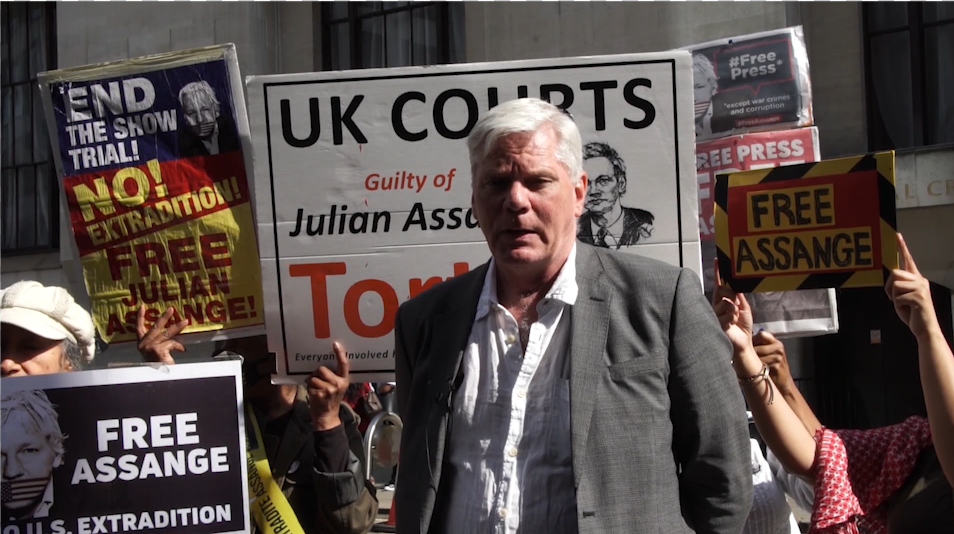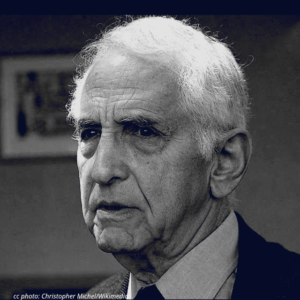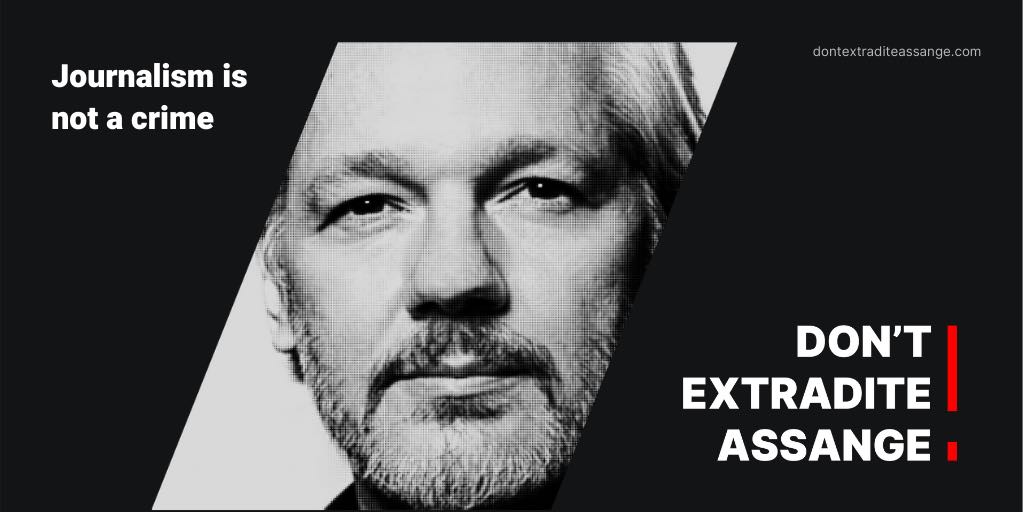SEPTEMBER 16, 2020

- See previous daily reports here and a video recap of last week’s proceedings here
- See an overview of USA v. Julian Assange here
- See a thread of live-tweets of today’s hearing here
- See today’s video about Redactions and War Crimes here
John Goetz on WikiLeaks’ “very rigorous redaction process”

American journalist John Goetz, who has worked in Germany for the last 30 years, testified today about his experiences as a media partner on WikiLeaks’ releases in 2010. Working for Der Spiegel, Goetz had already been reporting on Iraq and Afghanistan when he joined the partnership to report the Afghan War Diaries, the Iraq War Logs, and the State Department cables.
WikiLeaks’ Harm-Minimization Withheld 15,000 documents
Goetz was involved in early discussions and testified that Wikileaks spearheaded a “very rigorous redaction process,” beginning with the Afghanistan files. He said Assange himself was “very concerned with the technical aspect of trying to find the names in this massive collection of documents” so that “we could redact them, so they wouldn’t be published, so they wouldn’t be harmed.” He testified that Assange continually reminded the media partners to use secure communications, encrypted phones and apps, and while he seemed paranoid at the time, this is now standard journalistic practice.
Goetz also testified about WikiLeaks and the media partners’ conversations with the U.S. government ahead of publication. At one point the partners were on a conference call with the State Department in which U.S. officials would provide numbers of documents that they especially didn’t want published. They didn’t give specific names to redact but rather were indicating politically sensitive areas — when they realized that they were just calling attention to stories the journalists would be interested, they stopped.
The media partners also sent a delegation of New York Times reporters, who already had an office in Washington DC, to the White House to discuss the release ahead of time. As the Times’ Eric Schmitt emailed to Goetz immediately after the meeting, the media delegation passed on to the U.S. government that WikiLeaks would not be publishing some 15,000 documents within the Afghan War Diaries, and they asked the White House for any technical assistance they could provide to assist with redactions. That request, Goetz said, was met with “derision.”
As Goetz testified, Der Spiegel interviewed Assange in 2010 about his harm-minimization process
Assange: The Kabul files contain no information related to current troop movements. The source went through their own harm-minimization process and instructed us to conduct our usual review to make sure there was not a significant chance of innocents being negatively affected. We understand the importance of protecting confidential sources, and we understand why it is important to protect certain US and ISAF sources.
SPIEGEL: So what, specifically, did you do to minimize any possible harm?
Assange: We identified cases where there may be a reasonable chance of harm occurring to the innocent. Those records were identified and edited accordingly.
Iraq War Logs: WikiLeaks redacted more than the U.S. gov’t
Though he personally wasn’t as involved in later releases, Goetz testified that with future releases, WikiLeaks’ harm-minimization process developed over time, and he said that the organization “overshot” with the Iraq War Logs, and “ended up redacting more than the Defense Department did. Some of the files had been declassified and released under FOIA requests, so one could compare redactions and see that WikiLeaks had concealed more names than the U.S. government had.
WikiLeaks docs confirm CIA torture & escaping accountability
Giving an example of the types of stories that WikiLeaks releases assisted with, Goetz explained had been investigating the story of Khalid el-Masri, a German citizen who was kidnapped by the CIA in Macedonia, extraordinarily rendered to a black site in Afghanistan where he was detained and tortured in 2004. This wasn’t known at the time, so Goetz searched the documents for el-Masri’s name, saw that he had been brought to Afghanistan, and found the CIA kidnappers “who’d forced el-Masri onto a military plane, sodomized him and sent him” to Afghanistan.
Goetz tracked down the CIA agents responsible in the United States, interviewed them, and reported the story. Following that broadcast, a Munich state prosecutor issued an arrest warrant for the 13 CIA agents. But, Goetz said, “It turns out the arrest warrant was never actually issued to the United States.” When he saw the State Department cables, he discovered that the U.S. had pressured the German prosecutor to issue the warrant in a jurisdiction where the perpetrators didn’t live, threatening “repercussions” otherwise.
Following Goetz’s testimony, the defense wanted to read a statement from Khalid el-Masri himself into the court record. The prosecution objected, suggesting that el-Masri isn’t in the charges against Assange and therefore is irrelevant and shouldn’t be considered admissible. While still objecting, prosecutor James Lewis said the defense could read the statement “if it wants to waste half an hour of the court’s time.” The judge warned Lewis that the way he was objecting, he was going “down a risky path” that could involve accepting the defense’s evidence “unchallenged.”
The remote press video went down at this time, but journalists inside the court reported that discussion of el-Masri’s statement continued, with the government objecting because it didn’t want to imply that allowing his evidence to be read that the prosecution would stipulate that el-Masri was tortured by the U.S. government. The statement wasn’t read aloud and it appears the matter is yet to be resolved.
- See this BoingBoing video from 2010 on ‘WikiLeaks and the el-Masri case’ in which el-Masri relates his experiences: “El-Masri’s futile efforts at receiving justice in the U.S. are well-known, but cables recently leaked by Wikileaks reveal that the U.S. also warned German authorities not to allow a local investigation into his kidnapping.”
- Also see ‘El-Masri v. Macedonia‘, ‘Extraordinary Renditions: The Right to the Truth.’
Unredacted Cables Falsely Blamed on WikiLeaks
A central argument in the U.S. government’s case is that WikiLeaks published documents which, the government alleged, it knew would cause harm. Time and again the prosecution alerts witnesses to the fact that Assange is only charged with publishing on the internet the unredacted cables containing the names of sources who could have been harmed. The claim is misleading about the charges and was contradicted by both witnesses today.
While the three “pure publication” counts do indeed deal with the 2011 publication of unredacted cables, the 15 other charges, which charge Assange with “soliciting” “obtaining” and “receiving” the documents, deal with the full datasets of Iraq and Afghan war logs, the State Department cables, and the Guantanamo Bay detainee assessment briefs. The charges work in unison, relying on each other, and so the full set of documents must be discussed together. Furthermore, all of the documents — and any conduct that the judge deems relevant even if not in the charges — would be considered at sentencing, where the court considers factors to be mitigating or aggravating.
But even on the facts of it, today’s witnesses strongly disputed the government’s claims. Asked about the 2011 publication of unredacted cables, John Goetz explained what really happened: in February 2011, Guardian reporters David Leigh and Luke Harding published a book with a password to the unencrypted file set as the title of a chapter. German magazine Die Freitag published this information, which allowed eagle-eyed observers to use that password to unlock the files and publish them online in full. Most notably, they were released on Cryptome, a “rival leak site” as described by the government, but they were also mirrored on several other sites, so they could not be taken down and they were out of WikiLeaks’ hands.
Assange and other WikiLeaks staff called the State Department’s emergency phone line at the time (as you can see in this video clip) warning that sources had been named, but they were ignored.
The prosecution pointed to a Guardian article from September 2011, in which the media partners condemn WikiLeaks’ release of the unredacted cables (though they concede in the article that the material was first published by Cryptome). Goetz testified, however, that the media partners did not know the true chain of events at this time, it was only later put together that the password in Leigh and Harding’s book was to blame for the material being released.
Goetz also said that Assange had tried to stop Die Freitag from publishing information that would lead to the release of unredacted files.
Daniel Ellsberg: “I totally disagree with the ‘good Ellsberg / bad Assange’ theory”

Next the defense called Pentagon Papers whistleblower Daniel Ellsberg to testify about Assange’s motivations, Ellsberg’s own experience being prosecuted under the Espionage Act, and his view on the unredacted publication of State Department cables.
Ellsberg explained in his witness statement that he copied and released the Pentagon Papers, comprising 7,000 Top Secret files, to the New York Times in 1971 because they demonstrated that the United States government had “started and continued” the Vietnam War “with the knowledge that it could not be won” and successive presidential administrations lied to Congress and the public about it.
“My own actions in relation to the Pentagon Papers and the consequences of their publication have been acknowledged to have performed such a radical change of understanding. I view the WikiLeaks publications of 2010 and 2011 to be of comparable importance.”
In court, Ellsberg testified about Julian Assange’s political opinions, his opposition to war and believe that justice is brought about by transparency and accountability. He and Assange both felt that both the Afghan and Iraq wars were wrong and that it was “clear even to the layman” that the Iraq war was a “crime.” an “aggressive war” as defined by the United Nations. He compared the war in Afghanistan to the war in Vietnam, the former a “rerun” of the latter, as perpetrators of both knew that they could only result in a seemingly endless “stalemate.”
What had changed, Ellsberg said, was that in Afghanistan (and in Iraq), horrific abuses, illegal killings and war crimes had become normalized, so much so that they appeared in “low-level field reports.” The Iraq and Afghanistan War Logs are marked up to Secret, whereas the Pentagon Papers were all Top Secret. Ellsberg said he “would’ve been astonished to see similar reports in Vietnam” in low-level classification. They are now so routine, he said, that they appear in the leaked logs as just the normal course of war.
The famous ‘Collateral Murder’ video illustrates this further. The title of the video, taken from a U.S. Army Apache helicopter and documenting the gunning down of civilians including journalists, children, and their rescuers, was controversial when it was released in 2010. Assange was criticized for labeling the actions “murder,” but to Ellsberg, the title caught his eye for a different reason:
“There was no question to me that what I was witnessing at the time was murder. In fact, the problematic word in the title was ‘Collateral’, implying that it was unintended. This was murder, and a war crime. So I was very glad that the American public was confronted with this.”
Ellsberg spoke of the decision to leak them:
“I was very impressed that the source of these documents, Chelsea Manning, was willing to risk her liberty and even her life to make this information public. It was the first time in 40 years I saw someone else doing that, and I felt kinship toward her.”
Ellsberg and the Espionage Act
Asked if he was able to explain his own motivations when he was charged under the Espionage Act by the Nixon administration, Ellsberg said,
“No, absolutely not…I had withheld, in the nearly 2 years between the revelations and their release, discussion as to what led me to do that in the hopes that I could testify under oath, with sufficient solemnity and credibility.”
But at his 1973 trial, when his lawyer asked Ellsberg on the stand to explain his motivation, the government objected that the question was irrelevant, and the judge agreed. This established the Espionage Act as a “strict liability offense,” with every prosecution under the law in the years since handled in the same way.
“The Espionage Act does not allow for whistleblowing, to allow you to say you were informing the polity. So I did not have a fair trial, no one since me had a fair trial on these charges, and Julian Assange cannot remotely get a fair trial under those charges if he were tried.”
False Dichotomy
On cross-examination, the prosecution attempted to draw out a distinction between Ellsberg and Assange by citing Floyd Abrams, who along with James Goodale argued for the New York Times’ right to publish the Pentagon Papers, as Abrams has written that he believes WikiLeaks is different from the Ellsberg’s release. But Ellsberg said Abrams “doesn’t understand my motives or Julian’s” since he didn’t actually read through all the Pentagon Papers and didn’t discuss Ellsberg’s motivations with him.
Ellsberg added that this false dichotomy isn’t limited to Abrams. “And I’d say people who criticize Ed Snowden, Chelsea Manning, Julian Assange, they don’t want to criticize me — it is entirely misleading,” he said.
Ellsberg said at the time of his releases, he was harshly criticized, the way Snowden and Manning and Assange are now. Then for a long time he was ignored. And now that these new releases have come out, WikiLeaks’ in 2010 and Snowden’s NSA revelations in 2013, all of a sudden commentators were contrasting them with him, referring to Ellsberg positively “to draw some contrast between us.”
“I totally disagree with the ‘good Ellsberg / bad Assange’ theory,” he said. “Except for the computer aspects which didn’t exist back then, I see no difference between the charges against me and the charges against Assange.”
In addition to the personalities involved, the prosecution also attempted to draw a contrast between Assange’s and Ellsberg’s releases, in particular by highlighting the harm the government alleges was caused by WikiLeaks disclosures.
Prosecutor James Lewis cited the fact that Ellsberg withheld 4 volumes of documents from the media, though he gave the full set of files to the Senate, as well as the fact that Abrams quoted Ellsberg as having said, “I don’t want to get in the way of diplomacy,” whereas, Abrams says, Assange clearly does. The prosecution painted this as Ellsberg wanting to protect his country from harm. But Ellsberg clarified that at the time of his release, the U.S. and Vietnam had been engaged in peace negotiations. They were not progressing very well, but the talks were taking place, and Ellsberg didn’t want the release to be used as a pretext for withdrawing from peace talks.
Ellsberg recalls his own full quote: “I want to get in the way of the war, I don’t want to get in the way of negotiations.”
This is also the reason Ellsberg didn’t redact a single word of his releases, even allowing the publication of the name of a clandestine CIA agent (who he knew was already known in Vietnam). He didn’t want the public to think that the files had been edited or interfered with. He wanted to show there was no adequate justification for the killings in Vietnam, and he didn’t want to allow any implication that something he redacted covered up such a justification.
WikiLeaks did not cause harm
Lewis still attempted to get Ellsberg to concede that WikiLeaks’ documents were more harmful.
“Are you saying no one was placed in grave danger?”, he asked.
“It appears not, as there was no harm, as shown by the Defense Department,” Ellsberg said, referring to the fact that in Chelsea Manning’s court-martial, the government was forced to admit that it could not point to a single death that resulted from WikiLeaks’ releases.
Lewis then spent several minutes reading aloud from an affidavit from assistant U.S. attorney Gordon Kromberg on the government’s allegations of harm caused by WikiLeaks releases. These included many allegations and claims that were already attempted in Manning’s trial, such as the fact that WikiLeaks files were found in Osama Bin Laden’s compound, or the Taliban saying they would read through the datasets for informants to punish. These arguments were put forward in the government’s attempt to prosecute Manning for “aiding the enemy” — she was acquitted on that charge.
At one point, Ellsberg interrupted the prosecutor to ask if he would ever get the chance to respond to them. At the end of Lewis’ recitation, Ellsberg said, “I find the government recounting of these allegations to be cynical. Am I right in that none of these people actually suffered physical harm?”
Lewis responded, “The rules are that you do not get to ask the questions.”
Ellsberg reminded the court that the U.S. government was specifically asked to help redact the documents and declined to do so. Furthermore, he said, if there really was massive harm caused by the releases, he would have expected the government to show something far more concrete, or the Taliban to have pointed to actual informants they punished rather than merely talking about it.
Lewis spoke about some named informants having to flee their countries or their posts.
“I understand the anxiety that these people named might be harmed. And that anxiety is caused by the refusal to help WikiLeaks redact. But aside from that, people having to leave the country, must be put in the context of Mr Assange trying to end a war that has caused 37 million refugees and over a million deaths.”

